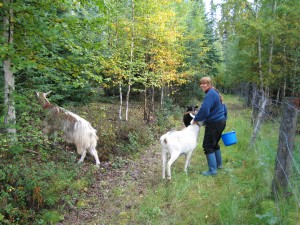Farmer grows with experience
September 16, 2010
9/16/10

For Jane Hocking, farming fits into the circle of life perfectly. “The plants, the animals, the soil, it’s all one big cycle,” she said.
In fact, the three components are so integral to each other she can’t envision farming without animals. Her menagerie includes goats, sheep, ducks, turkeys, chickens, a herding dog and a few old sled dogs. Each critter has a name, with her friend’s children often bestowing the monikers. It’s often too that friends are the ones who give her the animals.
Hocking, who grew up living across the U.S. due to a “father with itchy feet,” settled in Salcha in 1996 with her husband Roger. The couple has carved a lovely home and farm out of their 40 acres, using a lot of recycled materials. When they bought the land it had been previously logged and was covered in dry moss. Fenced areas intertwine with the natural forest setting, lending an idyllic, peaceful feeling to the place.
Hocking earned a degree in entomology at North Dakota State, then at a point in her life 20 years ago when she was at loose ends and friends were headed to Alaska she tagged along. She hasn’t exactly used the entomology knowledge in work but it helps her now. “Any education, especially in science, you learn to observe and to test ideas. That’s always useful.”
While growing up, her parents had raised vegetables but Hocking hadn’t tried it on her own till she got to Salcha. “Being so far from the grocery store we needed a garden,” she said. “We started with a garden and chickens and it went from there.” She credits Papa Meunier with being her mentor, as she spent a year working for him and learning about transplanting seedlings.
Hocking got her start selling produce at the now-defunct North Pole Farmers’ Market and has since graduated to the Tanana Valley Farmers’ Market. At her first marketing experience she said she learned how much she didn’t know and began asking the other farmers questions. “I’m probably the smallest and greenest of the people at the market,” she said, explaining that by green she means inexperienced. “I can’t compete head to head with the big guys.”
Rather than try to carve a piece of the bigger farms’ pie, Hocking has cleverly created her own niches to keep customers coming back to her booth. One idea that has clicked is the “dollar dinner” -- baggies of mixed produce that consumers can purchase for $1 and make a nice soup or vegetable dish out of easily. One customer who loves the dollar dinners said they make a nice lunch at work by just emptying the veggies in a glass dish and nuking them for a couple of minutes.
Another specialty of Hocking’s that she doesn’t have to work hard to sell is her fresh eggs, whether chicken, duck or turkey. “The demand is always much more than the supply,” she said. Despite the sudden burst of interest in buying local eggs due to the salmonella associated with mass-produced eggs, Hocking said lately it’s been pretty much business as usual. Whatever eggs the birds lay she quickly hands over to buyers.
Her lifestyle makes Hocking happy because she loves being outdoors and working for herself; the challenge is trying to make it pay. “Right now we are semi-subsistence; I’d like it to bring in more income, for it to pay for itself.”
One way she is trying to do that is by growing peonies, big colorful, scented blossoms that are in demand in the Lower 48 for weddings and other special occasions. She planted them last year in a pasture where she used to keep cows, but will have to wait a few years before they are harvestable.
“I keep trying things,” she said. “What works this year might not work next year.”


